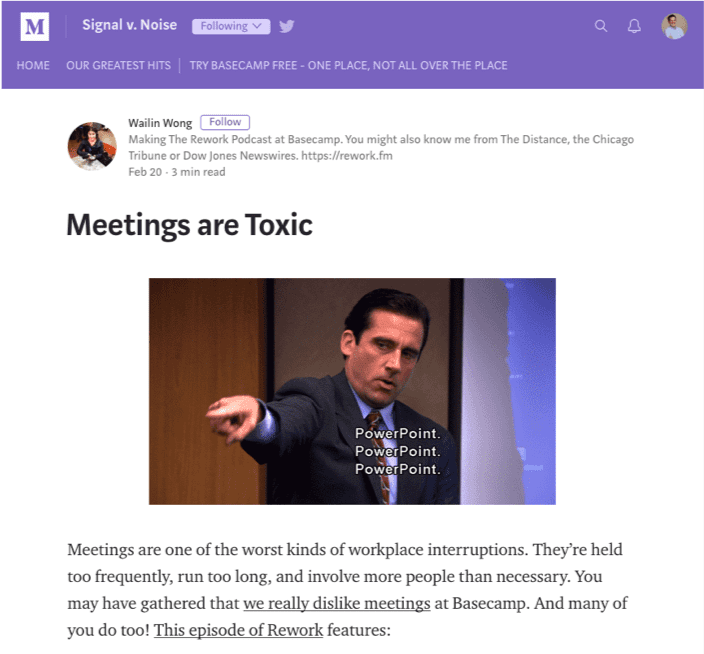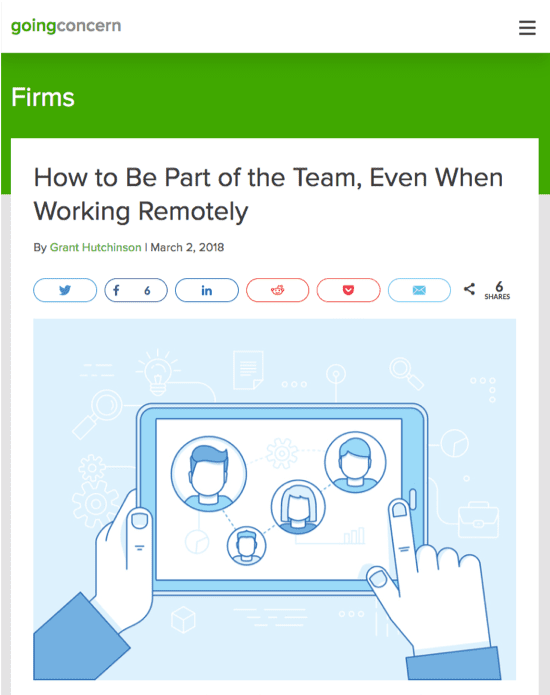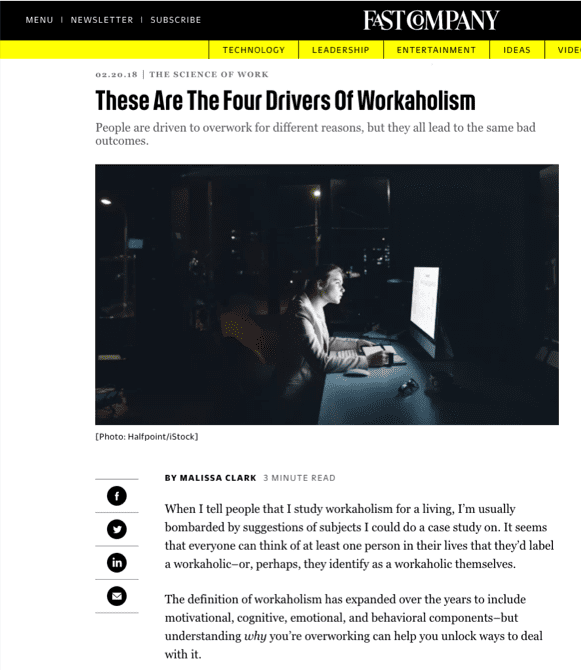
Blog -




Accounting
The Future of Accounting Teams with Jeff Phillips
Jeff Phillips joined the Cloud Accounting Podcast to discuss his views on workaholism, the need for fewer meetings, ways to improve diversity, how to be successful as a remote worker in the accounting profession, and why the future of accounting work is out of the office.
Recently I had the privilege of interviewing Jeff Phillips on the Cloud Accounting Podcast. Jeff is the CEO of Accountingfly and publisher of Going Concern, one of the top news sites for accountants on the web.
In his role as CEO of Accountingfly, a job site for just for accountants, Jeff has talked with hundreds, if not thousands, of CPAs over the years, so I was interested to talk to him about a number of hot topics in the accounting profession, including:
- Why workaholism in the accounting profession is more harmful than beneficial
- How firms can help their staff be more productive by holding fewer meetings
- Ways firms can improve diversity numbers through their recruitment efforts
- How remote workers can feel like part of the team even when they’re not in the office
Here’s an edited and condensed transcript of that interview:
Workaholism in the Accounting Profession and How to Prevent It
Blake: Hi everyone and welcome to the Cloud Accounting Podcast! My guest today is Jeff Phillips. He’s the CEO of Accountingfly, an all-in-one solution for hiring accounting and finance talent. Jeff, thanks for joining me today.
Jeff: It’s great to be here. Thanks for having me.
Blake: As usual, my guest and I have selected a few of our top stories from the past few weeks. We’re going to share those with you today and talk about them. First, we have a story called “These are the Four Drivers of Workaholism,” which appeared in Fast Company in February.
According to research cited in the article, workaholism doesn’t actually make people more productive than non-workaholics. The need to be working all the time isn’t healthy, and surprisingly it doesn’t have anything to do with engagement. People who are workaholics feel compelled to work simply because they feel like they should be working all the time.
The article breaks down workaholism into four categories:
- Motivational — These are the people that feel compelled to work because of the pressure to achieve (as discussed above).
- Cognitive — When you can’t turn off the work side of their brain. You’re always thinking about it.
- Emotional — Those who experience negative emotions and anxiety and guilt when they aren’t working.
- Behavioral — This is probably the most like public accounting — people who work beyond what is expected of them by their organization, because they want to be better than everyone else.
I’m interested, Jeff, in your insights on this topic. I’m sure you get plenty of people who are in the Big Four that have those tendencies, and they’re looking to make a change when they come to you in terms of finding a healthier work life balance — that sort of thing.
Jeff: That’s a great point. It’s ironic we’re talking about this article in the middle of busy season. I imagine that some of the accountants listening to your podcast are looking for an escape.What was compelling to me about this article is the definition of workaholism. Workaholism doesn’t mean you just work long hours. It means you feel compelled to work because of internal pressures. You can work long hours and not be a workaholic. It’s really about what’s going on inside your head. It’s not about work ethic — it’s about mistaken beliefs.
It’s also a reason people look for new jobs. They don’t apply to jobs during busy season, but they start looking for jobs at a higher clip during busy season than they do the rest of the year. So, if you’re an employer, you should think about that. Your staff might be looking for the way out during busy season. How you handle workaholism as a employer is super important.
Blake: I agree that it’s really important for employers to actively discourage workaholism, because otherwise your employees will burn out. So, what are the ways that firms can help their employees not become workaholics?
Jeff: That’s where my mind went as well — How do we change our beliefs about work? I’ll bet that everyone listening to this podcast has some degree of workaholism. Personally, I tend to go home and think about your work all the time. My take is the solution has to start with yourself. One thing that you can do as an employer is avoid creating a toxic work environment. Understand that there are humans with feelings that are working for you, and honor that through whatever HR policies you have.
Blake: One thing that I’ve heard of firms doing is implementing mandatory vacation. It’s the opposite of giving people the option of taking vacation. Instead, require them to take it — because a lot of people who are workaholics will never take their vacation. It’s not only good from an internal controls perspective but also good for like actually showing that your team that it’s important to take time off.
Jeff: The leaders inside a company need to take time off and make a big deal about it. For example, the leadership team at Gusto takes vacations and when they do they post on social media and send back pictures to the team. That sets a tone of, “Hey, it’s okay to take time off here. We’re not going to judge you for taking those allotted days.” I love the idea of mandatory vacation as a policy, because we’re all guilty of not taking our vacation. Almost no one takes all of their allotted vacation time. So, by making some of that mandatory, you’re going to have more balance in your life and your team’s life.
Why Meetings are Toxic and How to Cut Down on Them
Jeff: This article is called “Meetings are Toxic” on the blog Signal v. Noise, which is written by the company Basecamp.
Blake: I love that blog! So, what’s so bad about meetings?
Jeff: Most of the horror stories came from remote teams. There is this fear of CEOs — “What are my remote employees doing? I need to have meetings in order to reign them in and not feel so insecure about what they’re doing.” The main points are:
- Recurring meetings are a problem. Meetings should happen when people need to solve a problem or hash something out. What are recurring meetings? Recurring meetings are usually just updates of information that everybody in that room could read in a Slack channel or a Google Doc.
- Meetings should be relevant to everybody invited. If you’re having a meeting where you’re primarily discussing marketing, does the development team really need to be in that meeting? Aren’t you just robbing them of time from creative work? I don’t care if you’re in finance, or accounting, or your in creative work, or engineering, you’re at your best when you have long, uninterrupted blocks of time.
Blake: We use a tool called the Asana here for our marketing efforts. Asana is task management, project management, and collaboration. I’m working on the team to use that tool more. Every project should be in Asana. If you need to talk to somebody about something, create a conversation in Asana. It takes it out of email. People can still get email notifications if they want about these messages. But they don’t have to. Rather than waiting until a weekly status update meeting to talk, create a discussion thread right away. Then team members can respond asynchronously when it’s convenient for them. I’m a big fan of that method. It’s very difficult to change people’s habits, though.
Jeff: Towards the end of the podcast/article, they interviewed a CEO who had started a laundry company in Minneapolis and had worked at McKinsey before that. This guy says that when he was at McKinsey he was a big fan of sessions where you’re solving problems that require the full group’s brainpower — Now that’s a great reason to have a meeting.
One of my colleagues at Accountingfly recently said, “Let’s kill our team call.” Instead, let’s work together on Friday mornings — or maybe even Friday all day — and tackle the biggest company-wide problem that we have. We’ll get everyone together and just have a problem-solving work session. If we have a problem to solve, we’ll tackle it. If we don’t, we won’t meet.
So, to sum up, my takeaways are:
- only meet when necessary,
- only invite people that are truly needed,
- keep it as short as possible, and
- have meetings when it works for everybody’s schedule.
It’s hard to end meetings. I’m guilty of that. So, I’m going to make a public commitment right now: We’re going to end our team call on Friday mornings and only meet when we need to, and we’re going to start the problem solving sessions. Bring me on in six months. I’m going to let you know if I was able to commit to that or not.

Improving Diversity in the Profession
Blake: Story number three on the list is about one of my favorite companies: Gusto, the payroll and HR software developer. Back when I owned my own small accounting firm, I was an early Gusto customer. That’s when they were just a team of twelve in San Francisco.
This story appeared in February in Forbes. It’s called “The Tech Unicorn That Went For Women Engineers: Here’s How It Worked Out.” Basically, it’s a story about how Gusto did something that a lot of tech firms just can’t seem to do. A female engineer was unhappy that she was the only female on a team, of seventeen engineers. She went to one of the founders and said, “We’ve got to do something about this. This isn’t even representative of the number of female engineers in the industry.”
Rather than say, “Oh we got a lot to do. We’re a startup. We can’t focus on this.” Gusto took what she said to heart and decided to do something about it. They went from 6% to 21% women engineers in less than a year.
This story is applicable to the accounting profession because we have a big problem with there not being enough women in partner positions in accounting firms. So, how do you fix that? Well, Gusto did things like rewrite their job descriptions to avoid masculine phrases like “Ninja Rockstar.”
Jeff: Ninja Rockstar, love that.
Blake: It didn’t even occur to me that women wouldn’t be attracted to that type of job description, but it makes sense. For a six-month period in 2015, the company devoted 100% of its engineering recruitment efforts to women. They published a blog post making Gusto’s diversity numbers public and broadcast the company goal of hiring more women engineers.
So, Jeff like your public commitment to reduce number of status update meetings, Gusto made a public commitment to increase its diversity. They hired two in-house recruiters. They had an outside consultant look at their compensation policy to make sure that it wasn’t discriminatory. They implemented industry leading paid leave for a primary parent. In all, Gusto took really meaningful steps to address their problem.
Jeff: What a great article. I love Gusto. My takeaways from this are:
- Diversity in your team is a winning strategy.
- Recruiting the right people isn’t as simple as posting a job.
Gusto made a major commitment to recruiting the best talent. They treated it like a campaign. It was all or nothing. They didn’t have immediate success either. At first it wasn’t working, but by the end of it — the national average is 18% female in computer science programs — Gusto had 21% of females on their team. It took a major commitment getting that talent in the door.
What a wonderful way for the CTO to win the hearts of his team by saying, “We’re making this a serious priority for us. This is important.” This is a company that really lives its values. Values translate into company performance.
How to Be Part of the Team When Working Remotely
Jeff: This is an article on Going Concern called “How to Be Part of the Team When Working Remotely.” In accounting we’re just seeing the beginning days of remote accounting work. We’re at the starting point. Even among cloud accounting firms, it’s something like 25% of the jobs that are actually remote. That’s my best guess.
But remote work is on the rise. If you’re an accounting leader, you’re probably going to be making remote hires in the not-too-distant future. You’ll need to figure out how to prevent isolation. Remote work can get pretty darn isolating for team members. You might want to look at Slack (the team chat application). It’s an interesting tool. Slack is really great for water cooler type communication. There’s a lot of bonding and teamwork that can happen just by using the right chat tool.

 TeamBonding is another app to look at. It’s a way of creating games and fun activities for remote workers to play together over email or Slack.
TeamBonding is another app to look at. It’s a way of creating games and fun activities for remote workers to play together over email or Slack.
Blake: Some new apps have come out recently similar to Slack that will hopefully persuade more firms to adopt team chat tools. Last year Microsoft released Microsoft Teams, which is their version of Slack. It’s included in almost all Office 365 subscriptions. So, if your firm is on Office 365, you’ve now got Microsoft Teams included at no charge. I recommend folks give that a try as a way to bridge the gap with remote employees and bring them into that water cooler culture.
More recently, Google released their own version. Google’s version is called Hangouts Chat. Like Slack, Hangouts gives you persistent channels where people can communicate, not just one-off conversations.
Jeff: I think what this is speaking to is, how do we build culture in remote teams? These chat tools are definitely one way. But be careful! Don’t let chat turn into email. You have to be diligent. What are your thoughts on building culture inside remote companies?
Blake: My firm that I built and sold was a completely virtual bookkeeping company. We merged with a CPA firm that was also completely virtual. That was an interesting four years for me because I worked primarily from my home office.
I have to admit that I did start to feel a bit disconnected from my team members, especially ones that I wasn’t working with on a day-to-day basis. We would do annual get-togethers. That helped, but I would have loved it if we could have done them quarterly. I think that it’s really important to bring everyone together in the same place and be willing to spend the money to do that.
One thing that can mitigate that cost is to take a hybrid approach to your firm. Say, “We’re going to allow remote work, but everybody has to live in our region.” That’s the model that Catching Clouds uses. Everybody is in the greater Denver area, so they can all get together in a matter of a few hours if they need to, which I think the optimal set up. It works really well because you exponentially increase your pool of applicants if you offer that remote set up in a greater metro area. For instance, Los Angeles has 12 million people, but most of them are too far from any given point to commute there every day. So, if I had trouble recruiting I could take a hybrid approach and be able to employ a lot more people.
Jeff: The hybrid approach is interesting. That’s what we do at Accountingfly. We’re a mix. We have an office. You can come to the office. But I don’t expect you to come to the office. I have no expectations of a nine to five in the office workday. I come to the office, but I come to the office because that’s my preferred way to work. That’s how I’m the most productive.Quarterly get-togethers are a definite culture builder. I would say, too — this is kind of a funny one — if you use Zoom for your team calls, use the gallery view so that everybody is equal in the conference call — each person is an equal sized box on the screen.
We learned this the hard way. We had the team in Pensacola in a conference room, and we were dominating the conversation. Our remote employees felt like they were second class citizens. Using the gallery view equalized us.
We also do Zoom happy hours. It’s kind of corny, but it’s fun and helps to build a little bit of that team culture and bridges the gap between the quarterly get-togethers. Those are some things you can do to build culture.
Blake: My brother lives in New York City and I live in LA, so pretty much the only way that we hang out outside of Thanksgiving and Christmas (and the summer break for him, because he’s a teacher) is that we play games online. If you have a team that’s into gaming, you can try that, too. I know most firm owners would say, “I would never play video games with my team.” But it doesn’t have to be first-person shooters. It could be Words with Friends — casual games. You could create a tournament for your firm. That’s another way to build culture.
Jeff: It’s a great suggestion. I think the bottom line is that it’s harder to create culture in remote teams, but it’s also a necessary thing. You might as well start trying different ways to build team culture because you definitely don’t want to lose your talent.
The Remote Work Future of the Profession
Blake: Jeff, I wanted to give you the opportunity to talk a little bit about your projects, what you’re working on and what Accountingfly is.
Jeff: We just published a video with Bruce Phillips, CEO of HPC, on our YouTube channel. It’s an interview with Bruce talking about what a cloud accounting firm is, what the career opportunities are inside cloud accounting firms, and how you know if you’re qualified to do remote work and what are the advantages. Bruce is a visionary. I love talking to Bruce. So, please check that out. It’s super valuable. Accountingfly has been around for five years. We merged with Going Concern two years ago. We’re a digital staffing agency. While we’ve placed CPAs at companies as large as Facebook and as small as one partner accounting firms, where we see our future is in cloud accounting — building cloud accounting teams.
I think three years from now my clients will be coming to me to find them in-house managers who are working in highly flexible office, but committed to a location and committed to an accounting firm.
On that same team will be a remote CPA who’s in another city with a specialty that’s connected with the mission of the firm. At that same team will be a gig economy worker who is in-house on a project because they have a certain expertise.
All of these people will be working together to serve a client — part remote, part in person. To me, that’s what a cloud accounting team looks like. For us, I think a year from now 90% of the jobs that we’re recruiting for will be remote or cloud team jobs.
Blake: You told me an amazing stat recently that “cloud” or “hybrid” job postings — meaning postings where people don’t have to be in the office every day — get substantially more applicants than traditional in-house jobs. How much is it?
Jeff: I’m going to tell you two crazy statistics that are eye-opening for us for remote or hybrid jobs. A remote or a hybrid accounting job will get seven times the applicants that a traditional in-office CPA firm job gets. That’s pretty important because we’re in a time when most managing partners will say, “I can’t hire anybody. I can’t find talent.” We’re in what you could call a crisis.There are options to deal with this. You can hire freelancers. You can hire remotely. And you can start to change the way you operate your firm.
We did a heat map on a recent email. We have a list of 40,000 for recruiting. We sent an email with a handful of jobs to the list recently. I checked on what they clicked. There were five jobs listed. The first four jobs were office jobs. They had a one percent click through rate, or something like that. The remote job — posted by a teeny tiny cloud accounting firm — got 41% of the clicks.
Blake: Wow!
Jeff: That’s what the talent is interested in? Isn’t that crazy?
Blake: This lines up exactly with my own experience. My wife is a perfect example. She’s also a Millennial. She works for a very large company — Anthem Blue Cross. You wouldn’t expect it, but Anthem is very progressive with its remote work policies. Her team is distributed around the country. She is assigned to an office but she doesn’t have to go there.
Now, I know for a fact that Samantha could make 20% more — easily — if she went out and looked for a different job in L.A. given the market here. But she has no interest of doing that because she loves the flexibility of her job. She has an office she can go to, but doesn’t have to, and can work from home. And it really helps as a mom not having set nine to five hours. It’s all about getting your work done and just being available during the day for meetings. She is very happy. She’s not on the accounting side of things, but it’s exactly the same mentality of remote workers in accounting — she would never even consider going back to a traditional office job.
Jeff: Going back to the “Meetings are Toxic” article… One of the fears of going remote is “it wouldn’t work here,” here being public accounting or on an accounting team. Really, the fear boils down to the same reason why we’re having all these pointless meetings — Leaders fear not knowing what the person who is offered flexibility is doing. But there are ways to manage that. Your wife is probably a better employee and a more loyal employee because this very large corporation she works for has given her flexibility and responsibility.
Blake: They trust her. They don’t make her track her time. She works for a creative agency inside of an insurance company. These are people that you would think could not normally work remotely because they do creative work. Yet they can do it. If they can do it, accountants can do it. I challenge anyone listening to tell me why accountants can’t work remotely when a creative agency can.
Jeff: You and I both know that accountants can do it because you and I know a lot of accounting firms and companies that hire accountants that are absolutely crushing it doing that. They’re running circles around the competition.
Blake: I think that the reason some folks are not convinced is that they haven’t seen what technology can do to enable remote work. That’s the key. If you don’t have project management software in place, if you don’t have collaboration software in place, it’s impossible. You can’t work remotely via email. It’s also impossible to be productive in an office if you’re just using email. So what people really need to look at is getting those systems in place.
Shameless self-promotion — Close management software helps you do that for an accounting department. Combine flexibility with technology and you get really, really happy employees that aren’t going to leave.
Jeff: You just gave the perfect example of somebody who verified that theory.
Blake: That’s all our time today. Thank you to everyone for listening. I’m Blake Oliver at FloQast. My guest today was Jeff Phillips of Accountingfly. If you’re interested in getting more updates about cloud accounting, please consider subscribing to my newsletter Cloud Accounting Weekly.




